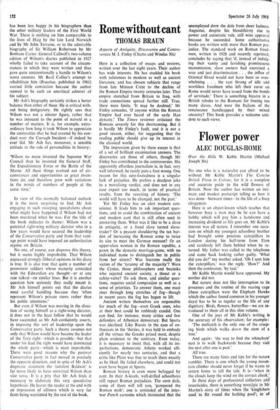Rome without cant
THOMAS .BRAUN
Here is a collection of essays and reviews, written over the last eight years. Their author has wide interests. He has studded his book with references to modern as well as ancient literature, and has chosen subjects that range from late Minoan Crete to the decline of the Roman Empire twenty centuries later. That empire stretched from Britain to Iraq, with trade connections spread further still. True, there were limits. 'It may be doubted,' Mr Finley concedes, 'if anyone within the Roman Empire had ever heard of the early Han dynasty.' The Times reviewer criticised the Romans severely for this shortcoming. But it is hardly Mr Finley's fault, and it is not a good reason, either, for suggesting that the reading public should give up its interest in the classical world.
The impression given by these essays is that of a set of brilliant examination answers. The discoveries are those of others, though Mr Finley has contributed to the controversies. His apparently effortless journalism is, in fact, very well informed; he rarely puts a foot wrong. One reason for this sure-footedness is a singular lack of prejudice. He prefers a deadpan joke to a moralising verdict, and does not in any case expect too much, in terms of practical results, from the rewriting of history. 'The world will have to be changed, not the past.'
Yet Mr Finley has an alert modern con- science. It leads him to ask important ques- tions, and to avoid the combination of ancient and modern cant that is still often used in answering them. What was it like to be a slave in antiquity, or a freed slave turned slave- trader? Or a peasant shouldering the tax bur- den of increasing the Roman army to twice its size to meet the German menace? Or an upper-class woman in the Roman republic, a pawn in the dynastic marriage-game, with no individual name to distinguish her in public from her sisters? Was Socrates really the victim of the 'tyranny of the majority'? Were the Cynics, those philosophers and beatniks who rejected ancient society, a threat or a safety-valve? To ask these, aria similar ques- tions, requires social compassion as well as a sense of priorities. To answer, them, one must steer through long stretches of fog—though in recent years the fog has begun to lift.
Ancient writers themselves are responsible for much of the fog—even Greek ones, who at their best could be ruthlessly candid. One can find, for instance, many 'critics and few defenders of Athenian democracy. But Sparta was idealised. Like Russia in the eyes of en- thusiasts in the 'thirties, it was held to embody all the virtues the Greeks prized most, despite plain evidence to the contrary. Even today, it is necessary to insist that, with all its im- perfections, democratic Athens worked effi- ciently for nearly two centuries, and that a critic like Plato was free to teach there exactly as he liked. He failed elsewhere, and could not even have begun at Sparta.
Roman history is even more befogged by cant. In their A-levels, well-drilled schoolboys still repeat Roman prejudices. The corn dole, some of them will tell you, 'pampered the Roman mob'; one is reminded. of the inter-
war Punch cartoons wbich insinuated that the
unemployed drew the dole from sheer laziness. Augustus, despite his bloodthirsty rise to power and autocratic rule, still wins approval because he succeeded. Some authoritative books are written with more than Roman pre- judice. The standard work on Roman freed- men, written in 1928 and recently reprinted, concludes by saying that 'if, instead of indulg- ing their vanity and lavishing promiscuous manumission, slave owners had exercised a wise and just discrimination . . . the influx of Oriental blood would not have been so over- whelming . . . the vast throng of idle and worthless freedmen who left their curse on Rome would never have issued from the bonds of servitude.' There is something bizarre in a British rebuke to the Romans for freeing too many slaves. And were the Italians of the renaissance handicapped by their mixed ancestry? This book provides a welcome anti- dote to such views.






































 Previous page
Previous page